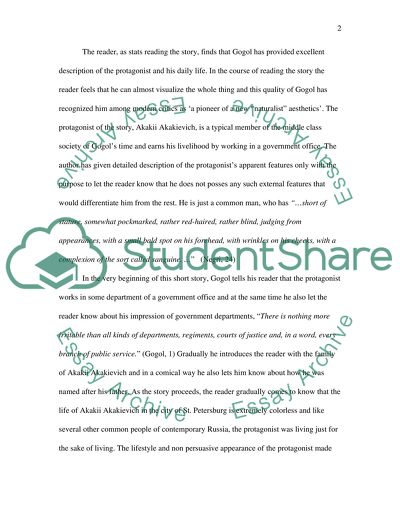Cite this document
(Role of the Supernatural Epilogue to Gogol's Shinel Book Report/Review, n.d.)
Role of the Supernatural Epilogue to Gogol's Shinel Book Report/Review. https://studentshare.org/literature/1551863-what-is-the-role-of-the-supernatural-epilogue-to-gogols-shinel-the-overcoat-does-it-force-you-as-a-reader-to-reinterpret-the-meaning-of-the-story-or-doest-it-remove-any-meaning-the-story-may-have-had
Role of the Supernatural Epilogue to Gogol's Shinel Book Report/Review. https://studentshare.org/literature/1551863-what-is-the-role-of-the-supernatural-epilogue-to-gogols-shinel-the-overcoat-does-it-force-you-as-a-reader-to-reinterpret-the-meaning-of-the-story-or-doest-it-remove-any-meaning-the-story-may-have-had
(Role of the Supernatural Epilogue to Gogol'S Shinel Book Report/Review)
Role of the Supernatural Epilogue to Gogol'S Shinel Book Report/Review. https://studentshare.org/literature/1551863-what-is-the-role-of-the-supernatural-epilogue-to-gogols-shinel-the-overcoat-does-it-force-you-as-a-reader-to-reinterpret-the-meaning-of-the-story-or-doest-it-remove-any-meaning-the-story-may-have-had.
Role of the Supernatural Epilogue to Gogol'S Shinel Book Report/Review. https://studentshare.org/literature/1551863-what-is-the-role-of-the-supernatural-epilogue-to-gogols-shinel-the-overcoat-does-it-force-you-as-a-reader-to-reinterpret-the-meaning-of-the-story-or-doest-it-remove-any-meaning-the-story-may-have-had.
“Role of the Supernatural Epilogue to Gogol'S Shinel Book Report/Review”. https://studentshare.org/literature/1551863-what-is-the-role-of-the-supernatural-epilogue-to-gogols-shinel-the-overcoat-does-it-force-you-as-a-reader-to-reinterpret-the-meaning-of-the-story-or-doest-it-remove-any-meaning-the-story-may-have-had.


